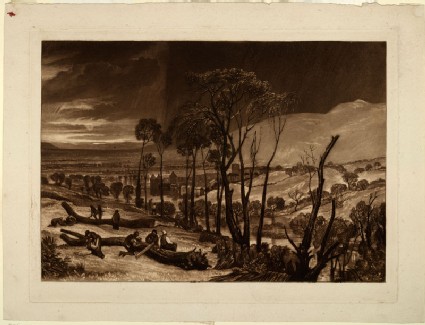Browse: 1470 objects
- Reference URL
Actions
Crowhurst (from the Unpublished Plates of the Liber Studiorum) Turner
-
Details
- Artist/maker
-
Turner (Joseph Mallord William Turner) (1775 - 1851) (designer, etcher)Henry Edward Dawe (1790 - 1848) (engraver)
- Object type
- Material and technique
- etching and engraving
- Associated place
-
- Europe › United Kingdom › England › Sussex, East › Rother › Crowhurst › Crowhurst (subject)
- Inscription
- Ruskin Drawing School - Lugt 2003a
- Provenance
-
Presented by John Ruskin to the Ruskin Drawing School (University of Oxford), 1875; transferred from the Ruskin Drawing School to the Ashmolean Museum, c.1949.
- No. of items
- 1
- Accession no.
- WA.RS.RUD.160
-
Subject terms allocated by curators:
Subjects
-
References in which this object is cited include:
References
Ruskin, John, The Ruskin Art Collection at Oxford: Catalogue of the Rudimentary Series, in the Arrangement of 1873, ed. Robert Hewison (London: Lion and Unicorn Press, 1984), cat. Rudimentary no. 154, RUD.154
Finberg, Alexander J., The History of Turner's Liber Studiorum: With a New Catalogue Raisonné (London: Ernest Benn, 1924), cat. 76.d, p.305
Ruskin, John, Instructions in Practice of Elementary Drawing, Arranged with Reference to the First Series of Examples in the Drawings Schools of the University of Oxford (n.p., [1872]), cat. Rudimentary no. 154
Ruskin, John, Instructions in the Preliminary Exercises Arranged for the Lower Drawing-School (London: Smith, Elder, 1872), cat. Rudimentary no. 154
Ruskin, John, Instructions in the Preliminary Exercise Arranged For the Lower Drawing-School (London: Spottiswoode, 1873), cat. Rudimentary no. 154
Ruskin, John, ‘Rudimentary Series 1878’, 1878, Oxford, Oxford University Archives, cat. Rudimentary no. 160
Ruskin, John, ‘The Ruskin Art Collection at Oxford: Catalogues, Notes and Instructions’, Edward T. Cook and Alexander Wedderburn, eds, The Works of John Ruskin: Library Edition, 39 (London: George Allen, 1903-1912), 21, cat. Rudimentary no. 160
Location
-
- Western Art Print Room
Position in Ruskin’s Collection
Ruskin's Catalogues
-
Ruskin's Rudimentary series, 3rd ed. (1872)
R|154} Winter Sunset. Unpublished plate, engraved by Turner with his own hand. -
Ruskin's Rudimentary series 4th ed. (1872)
R|154} Winter Sunset. Unpublished plate, engraved by Turner with his own hand. -
Ruskin's Rudimentary series, 5th ed. (1873)
R|154} Winter Sunset. Unpublished plate, engraved by Turner with his own hand. -
Ruskin's revision to the Rudimentary series (1878)
154. (154) 160. CrowhurstThis unpublished Plate, seen here in its finest state, is the most elaborate piece of work which Turner gave to wood scenery in the Liber. He seems R.Crowhurst to have meant to make it extremely beautiful and the record of a most solemn impression on his own mind from the Downs of Sussex, under light-falling snow with heavier storm coming on in twilight. The brown colour, however, of the engraving defeats his purpose: but the study is full of passages with which all students of English Landscape are so familiar that I take it for the most perfect introduction to all the following variety of English Scenes in the Book itself. It must represent all of them here, for we have only Fifteen more subjects to divide between Scotland and Switzerland, having already given ten to England.





